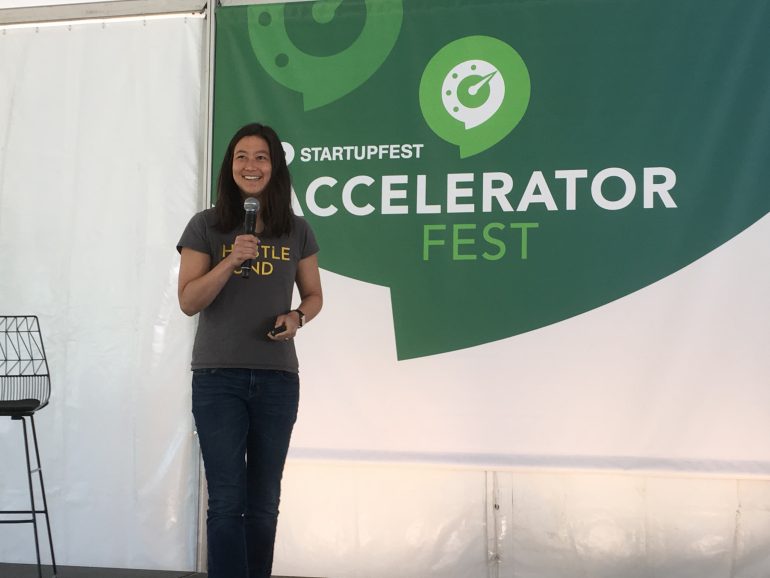Elizabeth Yin, general partner and co-founder of Hustle Fund, took to the stage at Startupfest on Wednesday to explain how accelerators can differentiate themselves by specializing in a specific sector and stage, and marketing themselves online and through partnerships with coworking spaces.
She asked the audience to question the need for every aspect of the accelerator – from Demo Days to cohorts to physical space.
“You should even question if you even need an accelerator,” said Yin. “Maybe it’s better to be a value-added fund. And within that, everything you do, do you need it? Does it help with deal flow?”
“Do the minimum you need to do to make the excellent companies that come into your program–for a particular reason– successful.”
Since Y Combinator and Techstars launched in 2005, the landscape has changed dramatically, she said, so the most important question for your accelerator is: how are you going to compete against Y Combinator? “There are lots of other good accelerators, but YC is king.”
Even government and non-profit accelerators that don’t need to make a profit need to compete against the top accelerators, because they need winners to spur the economy and continue operating as a fund.
“The number one reason people go to YC is for the networking and the branding,” she said. And if you’re attracting the best startups already, you can focus on what they need (e.g. scaling help) and skip other parts of the program.
How can accelerators compete? By specializing in very early, incubation, pre-seed, or late-stage companies, she said. For example, Science in LA takes late-stage, she explained. “They’ll pay to invest at a high valuation but take more in advisory shares.”
“It’s hard to have the best companies & the best programs. If you had to pick one, which one is more important? ?” – Elizabeth Yin, @HustleFundVC
Controversial topic but very important question! #StartupFest #AcceleratorFest pic.twitter.com/5LXlqMZb0M
— YSpace Markham (@YSpaceYU) July 11, 2018
They can also compete by changing the format of their program, for example, by offering it online. This can also save the accelerator rent and operating costs.
Accelerators should also consider spending more on attracting better companies than on the program itself.
“Do you need a cohort?” she said. “Do you need to treat everybody the same way? Does everybody get the same resources and treatment? Because when you think about it, you should be investing more in your winners and less on your losers.”
“These days, investors can go to demo days every day because there are so many accelerators. Why should they go to yours?”
“If you had to pick between having the best companies and the best program management, you should pick the best companies the whole time and dump the program management,” said Yin. “YC has actually pared down what they offer. But people still sign up for that because the best companies want to be with the best companies.” Acknowledging the controversial nature of her statement, she added: “In an ideal world, you have the best startups and the best program.”
She also suggested that Demo Days are an archaic practice, . “In 2005, they made a lot of sense because there weren’t that many,” she said. “These days, investors can go to demo days every day because there are so many accelerators. Why should they go to yours? I go to a lot of demo days and I see investors milling around in the back, not listening. They’re using it as a networking event with other investors. That’s okay, but people aren’t getting funding on their demo day because it’s a demo day.”
Instead, Yin says she uses office hours for Hustle Fund. “I emailed 200 investor friends and invited them into my office and matched them with companies to meet. YC does something similar. They have one day of just matching, essentially.”
Her closing remarks brought the tough love home: “Get the best companies and modify your program to retain and make those companies very happy. Do the minimum you need to do to make the excellent companies that come into your program–for a particular reason– successful.”

